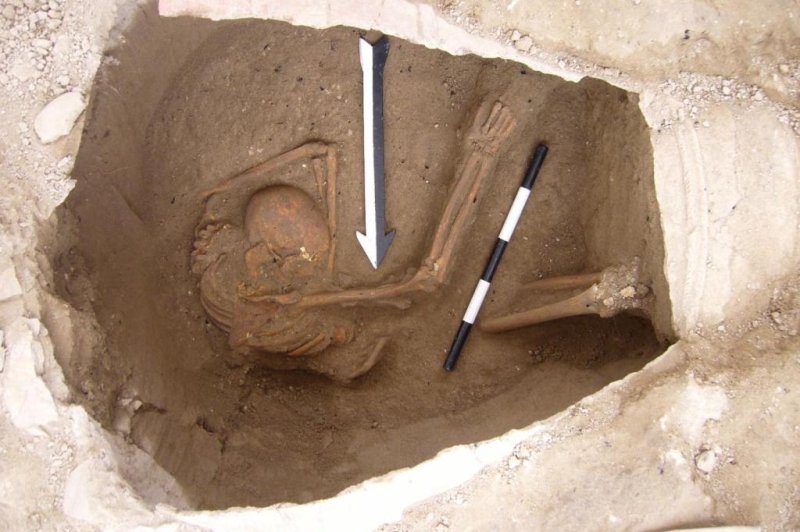One of five Canaanites found buried in present-day Lebanon from which scientists extracted and sequenced DNA. Photo by Dr. Claude Doumet-Serhal/the Sidon excavation
July 27 (UPI) -- The Bible mentions the Canaanites, a people of the Ancient Near East, several times. Archaeologists use the word to describe a group of settlers and pastoral nomads living among the southern Levant -- in present day Israel, Palestine, Lebanon, Syria and Jordan -- during the late 2nd millennium BC.
But exactly who they were, where they came from and what happened to them remain open questions.
Those questions may soon have answers, however, thanks to new DNA analysis.
For the first time, scientists have sequenced ancient Canaanite genomes after sequencing DNA material recovered from five Canaanite individuals who lived some 4,000 years in present day Lebanon.
Researchers also sequenced the genomes of 99 modern Lebanese people, allowing scientists to establish relationships among modern and ancient residents of the region. They share the results of their analysis this week in the American Journal of Human Genetics.
"We found that the Canaanites were a mixture of local people who settled in farming villages during the Neolithic period and eastern migrants who arrived in the region about 5,000 years ago," Marc Haber, researcher at the Wellcome Trust Sanger Institute in England, said in a news release. "The present-day Lebanese are likely to be direct descendants of the Canaanites, but they have in addition a small proportion of Eurasian ancestry that may have arrived via conquests by distant populations such as the Assyrians, Persians, or Macedonians."
During the 2nd and 1st millennium BC, conquest-driven genetic mixing was common. And indeed, the Canaanites received an influx for new genes from Eurasian people between 3,800 to 2,200 years. Despite this, the Canaanites and their descendants remained rather genetically distinct.
"In light of the enormously complex history of this region in the last few millennia, it was quite surprising that over 90 percent of the genetic ancestry of present-day Lebanese was derived from the Canaanites," researcher Chris Tyler-Smith said.
Both the genetic and archaeological records suggest the Canaanites have enjoyed cultural and genetic continuity since the Bronze Age.
"For the first time we have genetic evidence for substantial continuity in the region, from the Bronze Age Canaanite population through to the present day," lead excavator Claude Doumet-Serhal said. "These results agree with the continuity seen by archaeologists."















